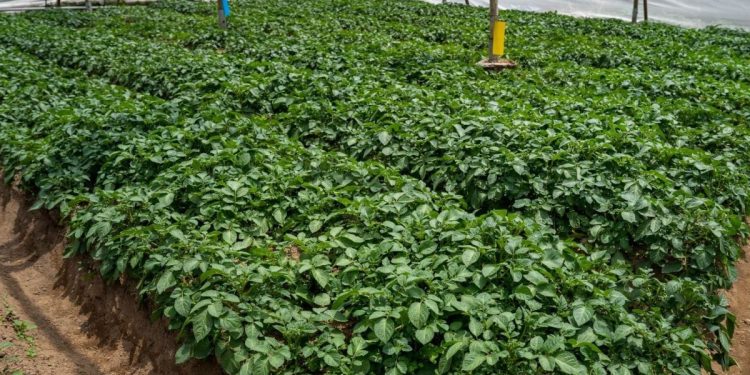#MeghalayaPotatoFarming #ARCPotatoProduction #IFAD #G0SeedProduction #DiseaseFreePotatoes #NetHouses #LocalEconomy #EmploymentOpportunities
The International Potato Center (CIP) has been working closely with farmers from Meghalaya to promote the production of quality seed potatoes using the Aeroponics Root Cutting (ARC) technique. This partnership has yielded significant benefits for local farmers, who are now able to produce disease-free seed potatoes in a much shorter time frame than traditional methods. Through the use of ARC, farmers are able to produce up to 20 times more seed potatoes per unit area, which has led to increased yields and profits. The CIP and Meghalaya farmers are continuing to collaborate on innovative solutions to improve potato production, which has the potential to benefit not only local farmers, but also communities and markets across the region.
Meghalaya, a state in northeastern India, has the unique advantage of three potato seasons in a year, and farmers are making the most of it by planting apical rooted cutting (ARC) in net houses and open fields for G0 seed production. This article explores the development and consequences of this new trend in potato farming and the potential for Meghalaya to become a leading ARC supplier to neighboring states.
Meghalaya is home to over 20,000 potato farmers who produce around 75,000 metric tonnes of potatoes every year. With the introduction of ARC, farmers are now able to produce high-quality potato seeds that are disease-free and have a high yield potential. The International Fund for Agricultural Development (IFAD) and Meghalaya Basin Management Agency have played a crucial role in providing financial support and partnership to introduce ARC in Meghalaya.
The process of producing ARC involves taking the topmost portion of a potato plant, including the stem and the leaves, and planting it in a nursery bed. The plant then grows roots from the stem, which are used to produce new plants. This process is repeated multiple times, and the resulting plants are then transplanted into net houses or open fields for G0 seed production. The use of net houses protects the plants from extreme weather conditions and pests, resulting in a higher yield of disease-free potatoes.
The development of ARC in Meghalaya has the potential to revolutionize potato farming not only in the state but also in neighboring states. Meghalaya could become a leading supplier of ARC potatoes, meeting the high demand for disease-free potato seeds in the region. This new trend in potato farming could also provide a much-needed boost to the local economy, generating employment opportunities and increasing farmers’ incomes.
In conclusion, the introduction of ARC in Meghalaya has opened up a new chapter in potato farming in the region. With the support of IFAD and Meghalaya Basin Management Agency, farmers in Meghalaya are leading the way in ARC production for potatoes. The potential for Meghalaya to become a leading supplier of ARC potatoes to neighboring states is enormous, and this development could have far-reaching consequences for the local economy and potato farming in the region.





